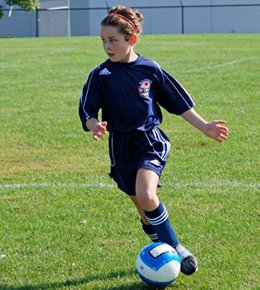 Everybody’s read your Facebook posts about your 7-year-old tearing up the soccer field—the next David Beckham, you say.
Everybody’s read your Facebook posts about your 7-year-old tearing up the soccer field—the next David Beckham, you say.
Now you’re wondering, is it time to join the travel squad? Maybe.
Before you start negotiating that signing bonus, there are a few things to consider.
When to consider travel leagues
Paul Keenan, one of the co-founders of Euro Soccer, an elite travel soccer program that serves Chicago’s northern and northwestern suburbs, says if a child displays an obvious passion for one particular sport, it may be time to consider what travel programs are available in your area.
“If you’re realistic about your kid being a good athlete, and they’re finding the level they are playing at is not quite good enough, begin asking questions.”
Listen to your kids
Keenan says parents can watch for certain cues from their children that may indicate a readiness to move to a more formal training program. Do they:
Seem bored or frustrated? Playing a sport can be similar to going to class—if the work isn’t challenging, kids can appear disenchanted.
Talk about playing at a higher level? When your kids start asking to play more or express a desire to try out for a club, parents should start gathering information about what clubs are available in their region.
Michael Conway was coaching his children’s teams in Wilmette when he realized they could benefit from a higher level of coaching.
“After a few years of park district soccer, I realized my kids had a real interest in continuing to play soccer,” he says. “My sense was that a travel environment would provide them with greater development opportunities and better coaching. “
Are they willing to forgo the neighborhood team? “I think things like park district and AYSO programs are an important part of a kid’s life,” says Keenan. “That’s where they start and see how much fun it can be. But they can only take kids so far.”
Do your research
When choosing a travel league for any sport, research available leagues in your community, what each one offers, and then decide the level of commitment your family is willing to make for a child to play.
Wilmette resident Megan Haveron considered a move to a private gymnastics program for her 8-year-old daughter, but the time commitment proved too much.
“The commitment level and hours of practice didn’t work for our family,” she says. “Technically, she is part of the travel team at Wilmette Park District, but the practice times and commitment level worked much better for our family.”
Rob Etheridge, a varsity soccer coach at Loyola Academy says parents should ask programs, “Who is looking after my child? What’s (the coach’s) background and qualifications? How old is he?”
Set expectations
Part of making the decision to play in and choosing a travel program is to know your expectations before your child hits the field, the pool or the rink.
“What’s the family’s expectation?” asks Etheridge. “Are you looking for Johnny to be the next superstar, or get as good as he can be, not only at soccer, but life skills as well.”
Expectations are not only those you set for your children. Don’t be afraid to ask travel clubs or leagues about their policies, including playing time and parent/coach communication. Do coaches have an established protocol for talking to parents? Are parents allowed to approach coaches at any time?
“Coaches should always be there to talk at just about every opportunity,” says Etheridge. “Most establish a 24-hour rule, but parents shouldn’t take that personally. Often, it can be just because a coach has another game or practice to get to and simply doesn’t have the time to give a conversation the justice it deserves.”

